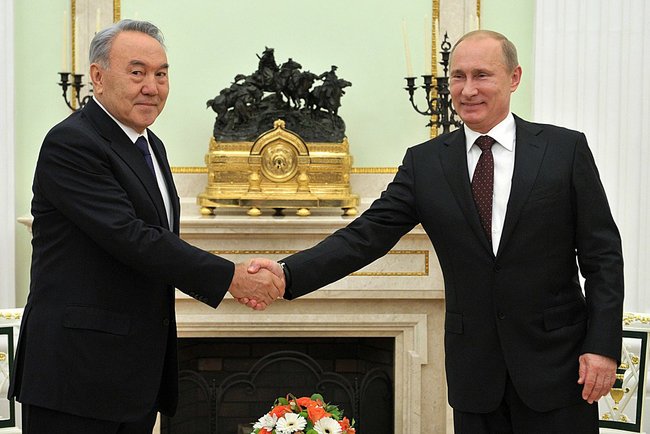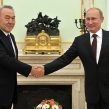
Russia and Kazakhstan Pledge to Renew Strategic Partnership amid Growing Dissatisfaction with Customs Union
Publication: Eurasia Daily Monitor Volume: 9 Issue: 191
By:

On October 9 and 10, Kazakhstan’s President Nursultan Nazarbayev paid an official visit to Moscow to celebrate 20 years of good-neighborly relations with its northern neighbor. Russia’s leader, Vladimir Putin, had recently visited Kazakhstan earlier in mid-September. The majority of issues discussed during the bilateral meetings in the presence of sectoral ministers largely remained out of the spotlight, as representatives of the media were only allowed to film the protocol part of Nazarbayev’s visit. However, both presidents subsequently made a number of important declarations.
After exchanging views with President Putin on the state of integration within the Customs Union and the Common Economic Area, Nazarbayev highlighted a 30-percent growth of bilateral trade between Russia and Kazakhstan since the entry into force of these two agreements (RIA Novosti, October 9). He also called Russia a “strategic partner” accounting for over $24 billion worth of cross-border trade in goods and services, reiterating his earlier commitment to increase this turnover up to $40 billion in the years to come (RIA Novosti, October 9; Newsland.ru, June 7). Nazarbayev further highlighted the fact that Kazakhstan is currently home to more than 1,700 joint-ventures while Russia hosts over 3,000 companies with a share of Kazakhstani capital (The Kremlin’s Press Office, October 9).
Therefore, Russia remains one of the most dynamic economic partners of Kazakhstan, basing its influence on a series of previously concluded inter-governmental agreements. Since 2001, the two countries have been cooperating in the production and processing of Kazakhstan’s natural gas, with the KazRosGas joint-venture operating on a major gas field in Karachaganak. Russia and Kazakhstan have also established a formal legal framework for the joint production of uranium on Kazakhstani territory, complementing this cooperation with a comprehensive strategy of nuclear energy development for civilian purposes (Newsland.ru, June 7). Moreover, Russia remains a primary transit country for Kazakhstan’s oil exports to external markets. The Atyrau-Samara pipeline currently permits the transport of 15.5 million tons of Kazakhstani oil toward Europe, while another pipeline ensures the annual transit of an additional 5.5 million tons up to the Russian seaport of Novorossiysk.
In their joint declaration following hours of talks behind closed doors, Putin and Nazarbayev instructed their respective governments to work out a new bilateral agreement aimed to replace the 1992 Treaty of Friendship, Cooperation and Mutual Assistance. This new document, whose adoption is expected before the end of 2013, will be called “the Good Neighbor and Alliance Treaty for the 21st Century” and should reflect the many achievements of Kazakhstani-Russian political dialogue as well as economic, military, scientific, cultural, and other forms of cooperation during the last 20 years (Newskaz.ru, October 10). Earlier in June, when Vladimir Putin was paying his first official visit to Kazakhstan as Russia’s freshly elected president, the two leaders had already signed a protocol to the 1992 Treaty amending some of its articles and extending its term for another 10 years (the Treaty was previously automatically prolonged in 2002).
The Protocol introduced several substantive changes to the initial treaty. Article 5 was complemented with a few lines confirming both countries’ willingness “to take joint measures aimed at establishing an effective system of collective security and rapid crisis response within the CSTO.” In Article 7, Russia and Kazakhstan no longer intend to “cooperate in the conversion of their war industries to civilian purposes and implement coordinated policies in the field of weapons and military technology imports/exports in compliance with international norms” (1992 version). The new wording of Article 7 provides that Moscow and Astana “shall actively cooperate in the modernization and reform of their armed forces, the supply of modern weaponry and military equipment with a view to enhancing combat preparedness, and on other issues in this area.” These modifications illustrate the change of rhetoric 20 years after the collapse of the Soviet Union, when Russia still considered a possibility of unilateral cuts in its war arsenals and even mulled over a closer partnership with NATO.
Despite the generally positive nature of Russian-Kazakhstani cooperation, their bilateral relations are not free of controversies. In late September, Nazarbayev’s political advisor Ermukhamet Ertysbayev publicly acknowledged that the establishment of a Eurasian Parliament could not be seriously considered in the short and even medium term. He namely averred that such a process must be preceded by the full harmonization of legislation in the Customs Union, saying that the functioning of this integration structure was still far from attaining its primary objectives (Newskaz.ru, September 20). At the same time, the Russian side has shown itself more optimistic about the prospect of further deepening post-Soviet integration under Moscow’s leadership.
Earlier in May, Sergei Naryshkin, the speaker of Russia’s Duma, already discussed with President Putin the creation of a trilateral expert commission to work out a “roadmap” leading up to a Eurasian Parliamentary Assembly, the necessary precursor of a full-fledged Eurasian Parliament. In his October interview to the Russian Information Agency, Naryshkin specified that such an Assembly should become operational by January 1, 2015, stressing that “[Russia, Kazakhstan and Belarus] will always be guided by the principles of free will, sovereignty, equality and accountability for their commitments” (RIA Novosti, October 4).
Although these differences of vision with regard to future integration processes in the post-Soviet context are thoroughly masked by both countries’ official media, Kazakhstan can hardly agree to blindly follow Moscow’s instructions, as the number of Kazakhstanis dissatisfied with higher prices and new complicated administrative procedures arising from the Customs Union continues to grow.




